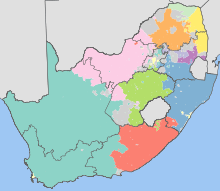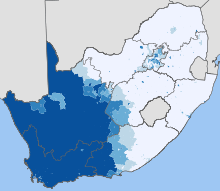- Languages of South Africa
-
South Africa has eleven official languages: Afrikaans, English, Ndebele, Northern Sotho, Sotho, Swazi, Tswana, Tsonga, Venda, Xhosa and Zulu. Fewer than one percent of South Africans speak a first language other than an official one.[1] Most South Africans can speak more than one language. Dutch and English were the first official languages of South Africa from 1910 to 1925. Afrikaans was added in 1925. Dutch was dropped when South Africa became a republic in 1961, so between 1961 and 1994, South Africa had two official languages: English and Afrikaans.[2].
The English version of the South African constitution refers to the languages by the names in those languages: isiZulu, isiXhosa, Afrikaans, Sepedi (referring to Northern Sotho), Setswana, English, Sesotho (referring to Southern Sotho), Xitsonga, Siswati, Tshivenda and isiNdebele (referring to Southern Ndebele).[3]
In South Africa, Southern Ndebele is known simply as Ndebele, as most speakers of Northern Ndebele live in Zimbabwe. The 1993 version of the Constitution referred to Northern Sotho as Sesotho sa Leboa, but the 1996 version referred to the language as Sepedi.[4] Different government departments and official bodies use different terms to denote Northern Sotho.[5][6]
The main language of government is English even if South Africans often take pride in using indigenous languages for any purpose. Afrikaans also features prominently in commerce together with English as the languages with the highest number of affluent speakers are Afrikaans and English.[7]
In terms of linguistic classification, the official languages include two West-Germanic languages (English and Afrikaans) and nine Bantu languages. Four of these are Nguni languages (Zulu, Xhosa, Swati and Ndebele) and three are Sotho–Tswana languages (Northern Sotho, Southern Sotho and Tswana). Tsonga is a Tswa–Ronga language.
South African Sign Language is a distinct though incompletely emerged[clarification needed] national standard language which also subsumes a cluster of semi-standardised dialects.
Contents
Language demographics
The most common language spoken at home by South Africans is Zulu (24 percent speak Zulu at home), followed by Xhosa (18 percent), and Afrikaans (13 percent). English is only the sixth-most common home language in the country, but is understood in most urban areas and is (mainly for political reasons) the dominant language in government and the media.[8]
The majority of South Africans speak a language from one of the two principal branches of the Bantu languages represented in South Africa: the Sotho–Tswana branch (Sotho, Northern Sotho, Tswana), or the Nguni branch (Zulu, Xhosa, Swati, Ndebele). For each of the two groups, the languages within that group are for the most part intelligible to a native speaker of any other language within that group.
As can be seen from the accompanying maps, the nine indigenous African languages of South Africa can be divided into two geographical zones, with Nguni languages being predominant in the south-eastern third of the country (Indian Ocean coast) and Sotho languages being predominant in the northern third of the country located further inland, as also in Botswana and Lesotho. Gauteng is the most linguistically heterogeneous province, with roughly equal numbers of Nguni, Sotho and Indo-European language speakers. This has resulted in the spread of an urban argot, Tsotsitaal, in large urban townships in the province.
Afrikaans, a language derived from Dutch, is the most widely spoken language in the western half of the country (Western and Northern Cape). It is spoken not only by a majority of whites but also by about 90 percent of Coloured (multiracial) people in the country. Afrikaans is also spoken widely across the centre and north of the country, as a second (or third or even fourth) language by Black South Africans living in farming areas.
Other significant languages spoken in South Africa
Other languages spoken in South Africa, though not mentioned in the Constitution, include Fanagalo, Lobedu (Khilobedu), Northern Ndebele (Sindebele), Phuthi (Siphuthi). Lobedu has been variously claimed to be a dialect of Northern Sotho and an autonomous language. Fanagalo is a pidgin often used as a mining lingua franca.
Significant numbers of immigrants from Europe, elsewhere in Africa, and the Indian subcontinent means that a wide variety of other languages can also be found in parts of South Africa. In the older immigrant communities there are: Greek, Gujarati, Hindi, Portuguese, Tamil, Urdu, Yiddish, and smaller numbers of Dutch, French and German speakers.
These non-official languages may be used in limited semi-official use where it has been determined that these languages are prevalent. More importantly, these languages have significant local functions in specific communities whose identity is tightly bound around the linguistic and cultural identity that these non-official SA languages signal.
The fastest growing non-official language is Portuguese - first spoken by white, black, and mulato settlers and refugees from Angola and Mozambique after they won independence from Portugal and now by more recent immigrants from those countries again - and increasingly French, spoken by immigrants and refugees from Francophone Central Africa.
More recently, speakers of North, Central and West African languages have arrived in South Africa, mostly in the major cities, especially in Johannesburg and Pretoria, but also Cape Town and Durban.
Constitutional provisions
Chapter 1 (Founding Provisions), Section 6 (Languages) of the Constitution of South Africa is the basis for government language policy. The English text of the constitution signed by president Nelson Mandela on 16 December 1996 curiously contains the names of the languages in the language itself rather than English. Controversy surrounds the use of Sepedi as opposed to Sesotho sa Leboa (which was the wording in the 1994 interim constitution) in the text. The spelling of Venda is also incorrectly rendered as Tshivenda instead of the correct Tshivenḓa: The constitution mentions "sign language" in the generic sense rather than, as is widely believed, South African Sign Language specifically.
“ -
- The official languages of the Republic are Sepedi, Sesotho, Setswana, siSwati, Tshivenda, Xitsonga, Afrikaans, English, isiNdebele, isiXhosa and isiZulu.
- Recognising the historically diminished use and status of the indigenous languages of our people, the state must take practical and positive measures to elevate the status and advance the use of these languages.
- (a) The national government and provincial governments may use any particular official languages for the purposes of government, taking into account usage, practicality, expense, regional circumstances and the balance of the needs and preferences of the population as a whole or in the province concerned; but the national government and each provincial government must use at least two official languages.
(b) Municipalities must take into account the language usage and preferences of their residents. - The national government and provincial governments, by legislative and other measures, must regulate and monitor their use of official languages. Without detracting from the provisions of subsection (2), all official languages must enjoy parity of esteem and must be treated equitably.
- A Pan South African Language Board established by national legislation must
(a) promote, and create conditions for, the development and use of -
(i) all official languages;
(ii) the Khoi, Nama and San languages; and
(iii) sign language; and
(b) promote and ensure respect for -
(i) all languages commonly used by communities in South Africa, including German, Greek, Gujarati, Hindi, Portuguese, Tamil, Telegu and Urdu; and
(ii) Arabic, Hebrew, Sanskrit and other languages used for religious purposes in South Africa.
” —"Constitution of the Republic of South Africa". Cape Town: Government of South Africa. 1996-12-18. http://www.info.gov.za/documents/constitution/1996/a108-96.pdf. Retrieved 1 December 2009.
Recognised languages
Official
 Most-used first languages in each of the provinces of the country, based on 2001 census:
Most-used first languages in each of the provinces of the country, based on 2001 census: Southern Sotho overall majority (Free State)Tswana overall majority (North West)Zulu overall majority (KwaZulu-Natal)
Southern Sotho overall majority (Free State)Tswana overall majority (North West)Zulu overall majority (KwaZulu-Natal)The 2001 census recorded the following home language speakers:[9]
Language Speakers % Zulu 10,677,000 23.8% Xhosa 7,907,000 17.6% Afrikaans 5,983,000 13.3% Northern Sotho 4,209,000 9.4% Tswana 3,677,000 8.2% English 3,673,000 8.2% Sotho 3,555,000 7.9% Tsonga 1,992,000 4.4% Swati 1,194,000 2.7% Venda 1,022,000 2.3% Ndebele 712,000 1.6% Other languages 217,000 0.5% Total 44,820,000 100.0% English, the country's lingua franca, is the language of business, politics, and modern communication media, but ranks sixth in home usage.[9]
Constitutionally recognised
- Hindi
- Khoi
- Nama
- Portuguese
- San
Other[clarification needed]
Extinct languages
- Xegwi
- Xam
- Seroa
See also
References
- ^ Census 2001: Census in brief. Statistics South Africa. 2009. p. 14. http://www.statssa.gov.za/census01/html/CInBrief/CIB2001.pdf.
- ^ http://www.info.gov.za/documents/constitution/83cons.htm
- ^ http://www.info.gov.za/documents/constitution/1996/96cons1.htm
- ^ http://www.info.gov.za/documents/constitution/93cons.htm
- ^ http://lists.translate.org.za/pipermail/translate-announce/2006q4/000003.html Translate.org.za Newsletter 2006: Sesotho sa Leboa or Sepedi. 14 November 2006. Retrieved 6 September 2011
- ^ http://www.dac.gov.za/chief_directorates/NLS/Website%20MULTILINGUAL%20NATURAL%20SCIENCES%20Sotho%20pdf%2019%20%20Nov%202008.pdf
- ^ http://www.tvsa.co.za/default.asp?blogname=news&articleID=4931
- ^ The Economist, "Tongues under threat", 22 January 2011, p. 58.
- ^ a b "The languages of South Africa". SA People. Johannesburg: Brand South Africa. 2009. http://www.southafrica.info/about/people/language.htm. Retrieved 2010-04-15.
- ^ "The 1961 constitution defines "Afrikaans includes Dutch".". Republic of South Africa Constitution Act 1961. 1961. http://en.wikisource.org/wiki/Page:Republic_of_South_Africa_Constitution_Act_1961_statute_book_scan.djvu/37. Retrieved 2010-12-04.
External links
- Introduction to the languages of South Africa
- Ethnologue Listing of South African Languages
- PanAfriL10n page on South Africa
- Statistics SA
- Hornberger, Nancy H. "Language Policy, Language Education, Language Rights: Indigenous, Immigrant, and International Perspectives." Language in Society, Vol. 27, No. 4 (Dec., 1998), pp. 439-458
 Languages of South Africa
Languages of South AfricaOfficial Southern BantuSwazi (siSwati) · Xhosa (isiXhosa) · Zulu (isiZulu)PanSALB1 1 unofficial languages mentioned in the 1996 constitutionLife in South Africa Crime · Culture · Demographics · Education · Health care · Income inequality · Languages · Politics · Poverty · Public Holidays · Racism · Religion · Social issues · Social structure · Sports · Standard of living · Trade unions
Languages of Africa Sovereign
states- Algeria
- Angola
- Benin
- Botswana
- Burkina Faso
- Burundi
- Cameroon
- Cape Verde
- Central African Republic
- Chad
- Comoros
- Democratic Republic of the Congo
- Republic of the Congo
- Côte d'Ivoire (Ivory Coast)
- Djibouti
- Egypt
- Equatorial Guinea
- Eritrea
- Ethiopia
- Gabon
- The Gambia
- Ghana
- Guinea
- Guinea-Bissau
- Kenya
- Lesotho
- Liberia
- Libya
- Madagascar
- Malawi
- Mali
- Mauritania
- Mauritius
- Morocco
- Mozambique
- Namibia
- Niger
- Nigeria
- Rwanda
- São Tomé and Príncipe
- Senegal
- Seychelles
- Sierra Leone
- Somalia
- South Africa
- South Sudan
- Sudan
- Swaziland
- Tanzania
- Togo
- Tunisia
- Uganda
- Zambia
- Zimbabwe
States with limited
recognition- Sahrawi Arab Democratic Republic
- Somaliland
Dependencies and
other territories- Canary Islands / Ceuta / Melilla / Plazas de soberanía (Spain)
- Madeira (Portugal)
- Mayotte / Réunion (France)
- Saint Helena / Ascension Island / Tristan da Cunha (United Kingdom)
- Western Sahara
Categories: -
Wikimedia Foundation. 2010.







